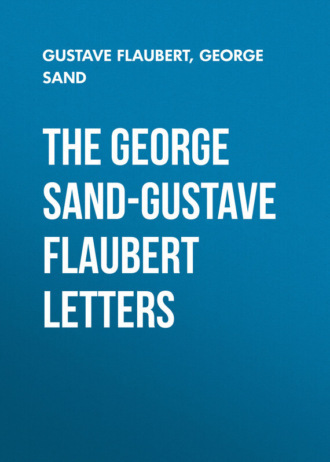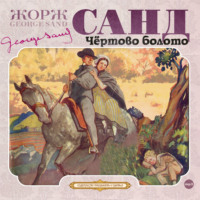 полная версия
полная версияThe George Sand-Gustave Flaubert Letters
There was no more question of any work, of any literature at all, than if none of us had ever learned to read. The LOCAL POETS pursued me with books and bouquets. I pretended to be dead and was left in peace. I am square with them now that I am home, by sending a copy of something of mine, it doesn't matter what, in exchange. Ah! what lovely places I have seen and what strange volcanic combinations, where we ought to have heard your Saint-Antoine in a SETTING worthy of the subject! Of what use are these pleasures of vision, and how are these impressions transformed later? One does not know ahead, and, with time and the easy ways of life, everything is met with again and preserved.
What news of your play? Have you begun your book? Have you chosen a place to study? Do tell me what is becoming of my Cruchard, the Cruchard of my heart. Write to me even if only a word! Tell me that you still love us as I love you and as all of us here love you.
G. Sand
CCLXII. TO GEORGE SAND
Croisset, Friday, 5th September, 1873
On arriving here yesterday, I found your letter, dear good master.
All is well with you then, God be praised!
I spent the month of August in wandering about, for I was in Dieppe, in Paris, in Saint-Gratien, in Brie, and in Beauce, hunting for a certain country that I had in mind, and I think that I have found it at last in the neighborhood of Houdan. But, before starting at my terrifying book, I shall make a last search on the road that goes from Loupe to Laigle. After that, good night.
The Vaudeville begins well. Carvalho up to now has been charming.
His enthusiasm is so strong even that I am not without anxieties.
One must remember the good Frenchmen who cried "On to Berlin," and then received such a fine drubbing.
Not only is the aforesaid Carvalho content with the le Sexe faible, but he wants me to write at once another comedy, the scenario of which I have shown him, and which he would like to produce a year from now. I don't think the thing is quite ready to be put into words. But on the other hand, I should like to be through with it before undertaking the story of my good men. Meanwhile, I am keeping on with my reading and note-taking.
You are not aware, doubtless, that they have forbidden Coetlogon's play formally, BECAUSE IT CRITICISED THE EMPIRE. That is the censorship's answer. As I have in the le Sexe faible a rather ridiculous general, I am not without forebodings. What a fine thing is Censorship! Axiom: All governments curse literature, power does not like another power.
When they forbade the playing of Mademoiselle La Quintinie, you were too stoical, dear master, or too indifferent. You should always protest against injustice and folly, you should bawl, froth at the mouth, and smash when you can. If I had been in your place with your authority, I should have made a grand row. I think too that Father Hugo was wrong in keeping quiet about le Roi s'amuse. He often asserts his personality on less legitimate occasions.
At Rouen they are having processions, but the effect is completely spoiled, and the result of it is deplorable for fusion! What a misfortune! Among the imbecilities of our times, that (fusion) is perhaps the greatest. I should not be surprised if we should see little Father Thiers again! On the other hand many Reds, from fear of the clerical reaction, have gone over to Bonapartism. One needs a fine dose of simplicity to keep any political faith.
Have you read the Antichrist? I find that indeed a beautiful book, aside from some faults of taste, some modern expressions applied to ancient things. Renan seems to me on the whole to have progressed. I passed all one evening recently with him and I thought him adorable.
CCLXIII. TO GUSTAVE FLAUBERT, at Croissset
Nohant, 3d October, 1873
The existence of Cruchard is a beautiful poem, so much in keeping, that I don't know if it is a fictitious biography or the copy for a real article done in good faith. I had to laugh a bit after the departure of all the Viardots (except Viardot) and the big Muscovite, who was charming although very much indisposed from time to time. He left very well and very gay, but regretting not to have been to see you. The truth is that he was ill just then. He has had a disordered stomach, like me, for some time. I get well by being moderate, and he does not! I excuse him; after these crises one is famished, and if it is because of an empty stomach that one has to fill up, he must be terribly famished. What a kind, excellent and worthy man! And what modest talent! Everyone adores him here and I give them the example. We adore you too, Cruchard of my heart. But you love your work better than your friends, and in that you are inferior to the real Cruchard, who at least adored our holy religion.
By the way, I think that we shall have Henry V. They tell me that I am seeing the dark side of things; I don't see anything, but I perceive the odor of sacristies that increases. If that should not last a long time, I should like our clerical bourgeois to undergo the scorn of those whose lands they have bought and whose titles they have taken. It would be a good thing.
What lovely weather in our country! I still go every day to dip into the cold rush of my little river and I feel better. I hope to resume tomorrow my work that has been absolutely abandoned for six months. Ordinarily, I take shorter holidays; but the flowering of the meadow saffron always warns me that it is time to begin grubbing again. Here it is, let us grub. Love me as I love you.
My Aurore, whom I have not neglected, and who is world: well, sends you a big kiss. Lina, Maurice send affection.
G. Sand
CCLXIV. TO GEORGE SAND
Croisset, Thursday
Whatever happens, Catholicism will receive a terrible blow, and if I were a devotee, I should spend my time before a crucifix saying: "Maintain the Republic for us, O my God!"
But THEY ARE AFRAID of the monarchy. Because of itself and because of the reaction which would follow. Public opinion is absolutely against it. The reports of messieurs the prefects are disquieting; the army is divided into Bonapartists and Republicans; the body of big business in Paris has pronounced against Henry V. Those are the bits of information that I bring back from Paris, where I have spent ten days. In a word, dear master, I think now that THEY will be swamped! Amen!
I advise you to read the pamphlet by Cathelineau and the one by Segur also. It is curious! The basis is clearly to be seen. Those people think they are in the XIIth century.
As for Cruchard, Carvalho asked him for some changes which he refused. (You know that sometimes Cruchard is not easy.) The aforesaid Carvalho finally realized that it was impossible to change anything in le Sexe faible without distorting the real idea of the play. But he is asking to play le Candidat first, it is not finished but it delights him – naturally. Then when the thing is finished, reviewed and corrected, perhaps he won't want it. In short, if after l'Oncle Sam, le Candidat is finished, it will be played. If not, it will be le Sexe faible.
However, I don't care, I am so eager to start my novel which will take me several years. And moreover, the theatrical style is beginning to exasperate me. Those little curt phrases, this continual scintillation irritates like seltzer water, which is pleasing at first but shortly seems like nasty water. Between now and January I am going to compose dialogues in the best manner possible, after that I am coming back to serious things.
I am glad to have diverted you a little with the biography of Cruchard. But I find it is hybrid and the character of Cruchard is not consistent! A man with such an executive ability does not have so many literary preoccupations. The archeology is superfluous. It belongs to another kind of ecclesiastics. Perhaps there is a transition that is lacking. Such is my humble criticism.
They had said in a theatrical bulletin that you were in Paris; I had a mistaken joy about it, dear good master whom I adore and whom I embrace.
CCLXV. TO GUSTAVE FLAUBERT
Your poor old troubadour, just getting well from a cruel attack of rheumatism, during which he could not lie down, nor eat, nor dress without aid, is at last up again. He suffered liver trouble, jaundice, rash, fever, in short he was fit to be thrown out on a pile of rubbish.
Here he is up again, very feeble, but able to write a few lines and to say with you AMEN to the buried catholic dictatorships; it is not even Catholics that they should be called, those people are not. They are only clericals.
I note today in the papers that they have played l'Oncle Sam. I hear that it is bad, but it may very well be a success all the same. I think that your play is surely postponed and Carvalho seems as capricious too, to me, as hard to put your finger on as other theatrical managers.
All Nohant embraces you and I embrace you even more, but I cannot write any more.
G. Sand Monday
Hard work? When indeed can I start at it? I am NO GOOD.
CCLXVI. TO GEORGE SAND
January, 1874
As I have a quiet moment, I am going to profit by it by talking a little with you, dear good master! And first of all, embrace for me all your family and accept all my wishes for a Happy New Year!
This is what is happening now to your Father Cruchard.
Cruchard is very busy, but serene and very calm, which surprises everybody. Yes, that's the way it is. No indignations, no boiling over. The rehearsals of le Candidat have begun, and the thing will be on the boards the first of February. Carvalho seems to me very satisfied with it! Nevertheless he has insisted on my combining two acts in one, which makes the first act inordinately long.
I did this work in two days, and Cruchard has been splendid! He slept seven hours in all, from Thursday morning (Christmas Day) to Saturday, and he is only the better for it.
Do you know what I am going to do to complete my ecclesiastical character? I am going to be a godfather. Madame Charpentier in her enthusiasm for Saint-Antoine came to beg me to give the name Antoine to the child that she is expecting! I refused to inflict on this young Christian the name of such an agitated man, but I had to accept the honor that was done me. Can you see my old top-knot by the baptismal font, beside the chubby-cheeked baby, the nurse and the relatives? O civilization, such are your blows! Good manners, such are your exactions!
I went on Sunday to the civic funeral of Francois-Victor Hugo. What a crowd! and not a cry, not the least bit of disorder! Days like that are bad for Catholicism. Poor father Hugo (whom I could not help embracing) was very broken, but stoical.
What do you think of le Figaro, which reproached him for wearing at his son's funeral, "a soft hat"?
As for politics, a dead calm. The Bazaine trial is ancient history. Nothing shows better the contemporary demoralization than the pardon granted to this wretched creature! Besides, the right of pardon if one departs from theology is a denial of justice. By what right can a man prevent the accomplishment of the law?
The Bonapartists should have let this alone; but not at all: they defended him bitterly, out of hatred for the 4th of September. Why do all the parties regard themselves as having joint interests with the rascals who exploit them? It is because all parties are execrable, imbecile, unjust, blind! An example: the history of Azor (what a name!). He robbed the ecclesiastics. Never mind! the clericals consider themselves attacked.
As regards the church. I have read in full (which I never did before) Lamennais' Essai sur l'indifference. I know now, and thoroughly, all the great buffoons who had a disastrous influence on the XIXth century. To establish common sense or the prevailing mode and custom as the criterion of certitude, that is preparing the way for universal suffrage, which is, to my way of thinking, the shame of human kind.
I have just read also, la Chretienne by the Abbe Bautain. A curious book for a novelist. It smacks of its period of modern Paris. I gulped a volume by Garcin de Tassy on Hindustani literature, to get clean. One can breathe, at least, in that.
You see that your Father Cruchard is not entirely stupefied by the theatre. However, I haven't anything to complain of in the Vaudeville. Everyone there is polite and exact! How different from the Odeon!
Our friend Chennevieres is now our superior, since the theatres are in his division. The theatrical people are enchanted.
I see the Muscovite every Sunday. He is very well and like him better and better.
Saint-Antoine will be in galley proof at the end of January.
Adieu, dear master! When shall we meet? Nohant is very far away! and
I am going to be, all this winter, very busy.
CCLXVII. TO GUSTAVE FLAUBERT
January, 1874
I am seized with a headache, but, although perfectly imbecile, I want to embrace you and thank you for having written to me on New Year's day. All Nohant loves you and smacks you, as they say in the country.
We wish you a magnificent success and we are glad that it is not to be at the cost of annoyances. However, that is hardly the way of the actors whom I have known, and at the Vaudeville I have found only those who were good natured. Have you a part for my friend Parade? And for Saint-Germain, who seemed to you idiotic one day when perhaps he had lunched too well, but who nevertheless is a fine addlepate, full of sympathy and spirit. And with real talent!
I am not reading all these horrid things that you feed on so as to sense better apparently the good things with which you sandwich them. I have stopped laughing at human folly, I flee it and try to forget it. As for admiration, I am always ready, it is the healthiest regime by far, and too, I am glad to know that I shall soon read Saint-Antoine again.
Keep in touch with your play and don't get ill this hateful winter.
Your old troubadour who loves you.
G. Sand
CCLXVIII. TO GEORGE SAND
Saturday evening, 7th February, 1874
I have at last a moment to myself, dear master; now let us talk a little.
I knew through Tourgueneff that you were doing very well. That is the main thing. Now I am going lo give you some news about that excellent Father Cruchard.
Yesterday I signed the final proof for Saint-Antoine. …But the aforesaid old book will not be published until the first of April (like an April fool trick?) because of the translations. It is finished, I am not thinking any more about it! Saint-Antoine is relegated, as far as I am concerned, to the condition of a memory! However I do not conceal from you that I had a moment of great sadness when I looked at the first proof. It is hard to separate oneself from an old companion!
As for le Candidat, it will be played, I think, between the 2oth and the 25th of this month. As that play gave me very little trouble and as I do not attach great importance to it, I am rather calm about the results of it.
Carvalho's leaving irritated and disturbed me for several days. But his successor Cormon is full of zeal. Up to now I have nothing but praise for him, as for all the others in fact. The people at the Vaudeville are charming. Your old troubadour, whom you picture agitated and always angry, is gentle as a lamb and even good natured! First I made all the changes that THEY wanted, and then THEY put back the original text. But of my own accord I have cut out what seemed to me too long, and it goes well, very well. Delannoy and Saint-Germain have excellent wigs and play like angels. I think it will be all right.
One thing vexes me. The censorship has ruined the role of a little legitimist ragamuffin, so that the play, conceived in the spirit of strict unpartisanship, has now to flatter the reactionaries: a result that distresses me. For I don't want to please the political passions of anyone, no matter who it may be, having, as you know, an essential hatred of all dogmatism, of all parties.
Well, the good Alexander Dumas has made the plunge! Here he is an Academician! I think him very modest. He must be to think himself honored by honors.
CCLXIX. TO GUSTAVE FLAUBERT
Nohant, 15 February, 1874
Everything is going well, and you are satisfied, my troubadour. Then we are happy here over your satisfaction and we are praying for success, and we are waiting impatiently Saint-Antoine so as to read it again. Maurice has had a cold which attacks him every other day. Lina and I are well, little girls superlatively so. Aurore learns everything with admirable facility and docility; that child is my life and ideal. I no longer enjoy anything except her progress. All my past, all that I have been able to acquire or to produce, has no value in my eyes unless it can profit her. If a certain portion of intelligence and goodness was granted to me, it is so that she may have a greater share. You have no children, be therefore a litterateur, an artist, a master; that is logical, that is your compensation, your happiness, and your strength. And do tell us that you are getting on, that seems to us the main thing in life. – And keep well, I think that these rehearsals which make you go to and fro are good for you.
We all embrace you fondly.
G. Sand
CCLXX. TO GEORGE SAND
Saturday evening, 28 February, 1874
Dear master,
The first performance of le Candidat is set for next Friday, unless it is Saturday, or perhaps Monday the 9th? It has been postponed by Delannoy's illness and by l'Oncle Sam, for we had to wait until the said Sam had come down to under fifteen hundred francs.
I think that my play will be very well given, that is all. For I have no idea about the rest of it, and I am very calm about the result, a state of indifference that surprises me greatly. If I were not harassed by people who ask me for seats, I should forget absolutely that I am soon to appear on the boards, and to expose myself, in spite of my great age, to the derision of the populace. Is it stoicism or fatigue?
I have been having and still have the grippe, the result of it for your Cruchard, is a general lassitude accompanied by a violent (or rather a profound) melancholy. While spitting and coughing beside my fire, I muse over my youth. I dream of all my dead friends, I wallow in blackness! Is it the result of a too great activity for the past eight months, or the radical absence of the feminine element in my life? But I have never felt more abandoned, more empty, more bruised. What you said to me (in your last letter) about your dear little girls moved me to the depths of my soul! Why haven't I that? I was born with all the affections, however! But one does not make one's destiny, one submits to it. I was cowardly in my youth, I had a fear of life! One pays for everything.
Let us speak of other things, it will be gayer.
H. M. the Emperor of all the Russias does not like the Muses. The censorship of the "autocrat of the north" had formally forbidden the transportation of Saint-Antoine, and the proofs were returned me from Saint Petersburg, last Sunday; the French edition even will be prohibited. That is quite a serious money loss to me. It would have taken very little for the French censorship to forbid my play. Our friend Chennevieres gave me a good boost. Except for him I should not be played. Cruchard does not please the temporal powers. Isn't it funny, this simple hatred of authority, of all government whatever, for art!
I am reading now books on hygiene. Oh! but they are comic! What assurance physicians have! what effrontery! what asses for the most part! I have just finished the Gaule poetique of Marchangy (the enemy of Beranger). This book gave me hysterics.
So as to retemper myself in something stronger, I reread the great, the most holy, the incomparable Aristophanes. There is a man, that fellow! What a world in which such work were produced!
CCLXXI. TO GUSTAVE FLAUBERT
Nohant, March, 1874
Our two little girls cruelly ill with the grippe have taken up all my time, but I am following, in the papers, the course of your play. I would go to applaud it, my cherished Cruchard, if I could leave these dear little invalids. So it is on Wednesday that they are going to judge it. The jury may be good or stupid, one never knows!
I have started grubbing again after having rested from the long and successful novel published by the Revue. I shall send it to you when it is published in book form.
Don't you delay to give me the news on Thursday, I don't need to tell you that success and the lack of it prove nothing, and that it is a ticket in a lottery. It is agreeable to succeed; to a philosophical spirit it ought not to be very distressing to fail. As for me, without knowing the play, I predict a success on the first day. As for its continuance, that is always unknown and unforeseen from day to day.
We all embrace you very affectionately.
G. Sand
CCLXXII. TO GEORGE SAND
Thursday, one o'clock, 12 March, 1874
Speaking of FROSTS, this is one! People who want to flatter me insist that the play will do better before the real public, but I don't think so! I know the defects of my play better than anyone. If Carvalho had not, for a month, bored me to death with corrections that I have cut out, I would have made re-touches or perhaps changes which would perhaps have modified the final issue. But I was so disgusted with it that I would not have changed a line for a million francs. In a word, I am dished.
It must be said too that the hall was detestable, all fops and students who did not understand the material sense of the words. They made jokes of the poetical things. A poet says: "I am of 1830, I learned to read in Hernani, and I wanted to be Lara." Thereupon a burst of ironical laughter, etc.
And moreover I have fooled the public in regard to the title. They expected another Rabagas! The conservatives have been vexed because I did not attack the republicans. Similarly the communists would have liked some insults against the legitimists.
My actors played superbly, Saint-Germain among others; Delannoy who carries all the play, is distressed, and I don't know what to do to soften his grief. As for Cruchard, he is calm, very calm! He had dined very well before the performance, and after it he supped even better. Menu: two dozen oysters from Ostend, a bottle of champagne frappe, three slices of roast beef, a truffle salad, coffee and a chaser. Religion and the stomach sustain Cruchard.
I confess that I should have liked to make some money, but as my fall involves neither art nor sentiment I am profoundly unconcerned.
I tell myself: "well, it's over!" and I experience a feeling of freedom. The worst of it all is the scandal about the tickets. Observe that I had twelve orchestra seats and a box! (Le Figaro had eighteen orchestra seats and three boxes.) I did not even see the chief of the claque. One would say that the management of the Vaudeville had arranged for me to fail. Its dream is fulfilled.
I did not give away a quarter of the seats that I needed and I bought a great many for people who slandered me eloquently in the lobbies. The "bravos" of a devoted few were drowned at once by the "hushes." When they mentioned my name at the end, there was applause (for the man but not for the work) accompanied by two beautiful cat- calls from the gallery gods. That is the truth.
La Petite Presse of this morning is polite. I can ask no more of it. Farewell, dear good master, do not pity me, for I don't feel pitiable.
P. S. – A nice bit from my servant when he handed me your letter this morning. Knowing your handwriting, he said sighing: "Ah! the best one was not there last evening!" That is just what I think.
CCLXXIII TO GEORGE SAND
Wednesday, April, 1874
Thank you for your long letter about le Candidat. Now here are the criticisms that I add to yours: we ought to have: (1) lowered the curtain after the electoral meeting and put the entire half of the third act into the beginning of the fourth; (2) cut out the anonymous letter, which is unnecessary, since Arabelle informs Rousselin that his wife has a lover; (3) inverted the order of the scenes in the fourth act, that is to say, beginning with the announcement of the tryst between Madame Rousselin and Julien and, making Rousselin a little more jealous. The anxieties of his election turn him aside from his desire to go to entrap his wife. Not enough is made of the exploiters. There should be ten instead of three. Then, he gives his daughter. The end was there, and at the instant that he notices the blackguardism, he is elected. Then his dream is accomplished, but he feels no joy over it. In that manner there would have been moral progress.









